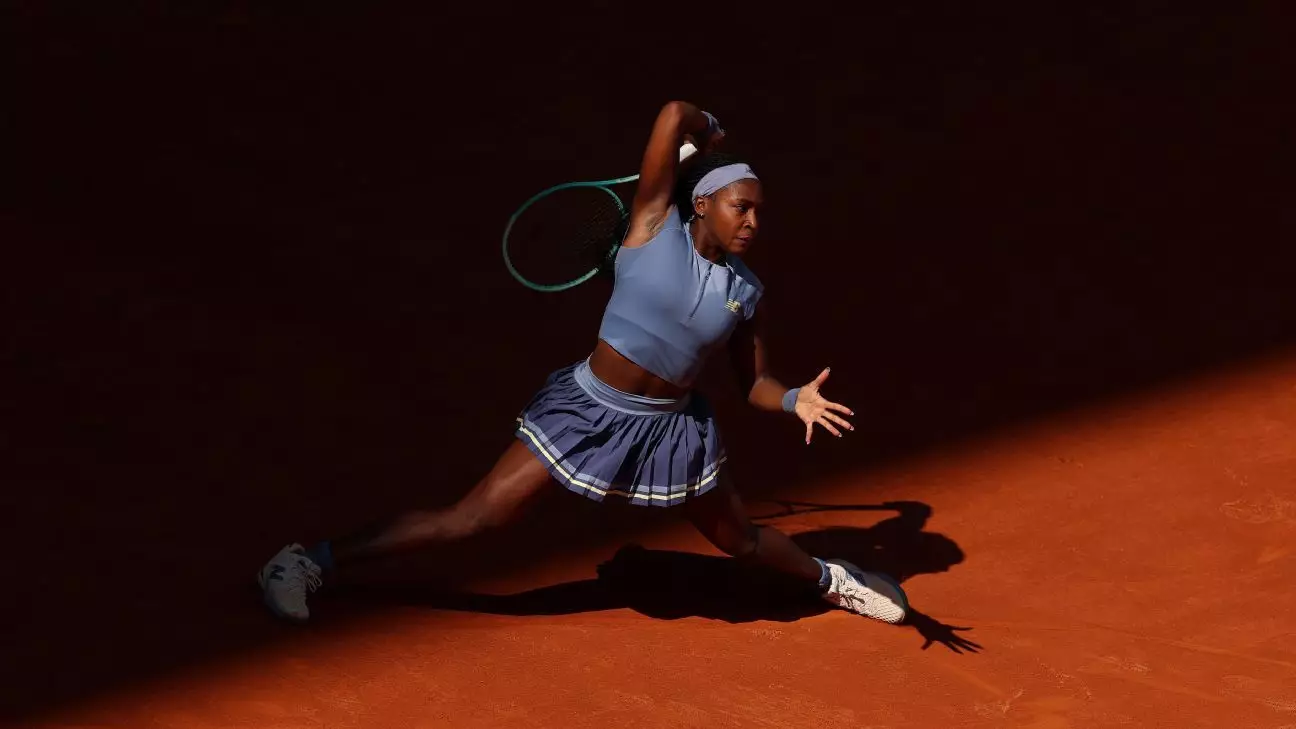Coco Gauff has made headlines once again, this time decisively toppling the reigning champion, Iga Swiatek, with a resounding score of 6-1, 6-1 during the semifinals of the Madrid Open. This victory not only propels Gauff into her first Madrid singles final but also symbolizes a shift in the landscape of women’s tennis. At just 19 years old, Gauff is already proving to be a considerable force in the sport, and her performance against Swiatek showcases both her skill and her growing confidence on the clay courts.
Gauff’s approach throughout the match was characterized by an aggressive mindset that seemed to unsettle her opponent from the very start. Winning three service breaks in the first set and two in the second, Gauff dominated the playing field, effectively exerting her game style on Swiatek. Her assertion, “I forced her into some awkward positions,” reflects not only her tactical prowess but also her innate ability to adapt and decide the pace of the match. This capability is critical to her current trajectory — she’s now on a 3-0 winning streak against Swiatek since their encounters in late 2024, reversing a previously daunting head-to-head statistic that favored the Polish star.
Crumbling Under Pressure: Swiatek’s Struggles
Swiatek’s performance contrasts sharply with Gauff’s. While she is undeniably a top-tier player, the match revealed vulnerabilities that may leave fans questioning her current readiness against an empowered competitor like Gauff. The Polish athlete notably struggled with her movement and rhythm throughout the match, likening her performance to a process of “collapsing.” Such candid assessments are refreshing but indicate deeper issues. Her admission that she lacked a Plan B highlights the critical point that even elite athletes can falter under pressure, particularly when their initial strategies are ineffective.
The once-unshakable confidence of Swiatek appeared to waver, especially after her recent comeback from a lackluster start against Madison Keys. This inconsistency suggests that mental fortitude, often regarded as the cornerstone of success in high-stakes matches, may currently be working against her. The audibility of her frustration earned her a code violation, an unusual occurrence that speaks volumes about her struggles to maintain composure. Swiatek’s reflections reveal a player keenly aware that more than technical skill is needed to secure victories — mental resilience is equally imperative.
A Shift in Momentum for Women’s Tennis
As Gauff prepares to face off against either Aryna Sabalenka or Elina Svitolina in the final, a significant narrative emerges: a potential changing of the guard within women’s tennis. Gauff’s win over Swiatek may herald the arrival of a new generation of players poised to challenge established champions. Each contest between these players adds a layer of intrigue to the sport, and Gauff’s performance raises the question of what the future holds for the WTA circuit.
The Madrid Open is not just a platform for individual achievements but also a barometer for the evolving dynamics within the sport. Gauff represents the youthful exuberance and resilience that can disrupt the status quo, while Swiatek embodies the challenges faced by even the most gifted players. The fact that this specific match foreshadows potential rivalries makes it even more exciting for fans and analysts alike; every clash holds the promise of uncovering fresh talent.
Other Tournament Highlights
While Gauff’s triumph commands significant attention, the Madrid Open offers a comprehensive tournament experience. Notably, Casper Ruud’s impressive performance against Daniil Medvedev forges his path to becoming a prominent contender in the tournament. Ruud’s ability to overturn previous losses illustrates the importance of resilience and adaptability on the clay surface, paralleling Gauff’s narrative in the women’s draw.
Moreover, the tournament’s disruption due to a significant blackout provided a formidable test of character for all participants. The necessity to adapt to a packed schedule adds another layer of complexity to the week’s events, underscoring the unpredictable nature of the Open. Players must not only compete against each other but also navigate the challenges posed by external circumstances.
The Madrid Open thus emerges as a pivotal stage, highlighting not just individual brilliance but also a broader evolution in the sport. With Gauff leading the charge, the future of women’s tennis is not merely promising; it’s ripe for revolutionary change.


Leave a Reply